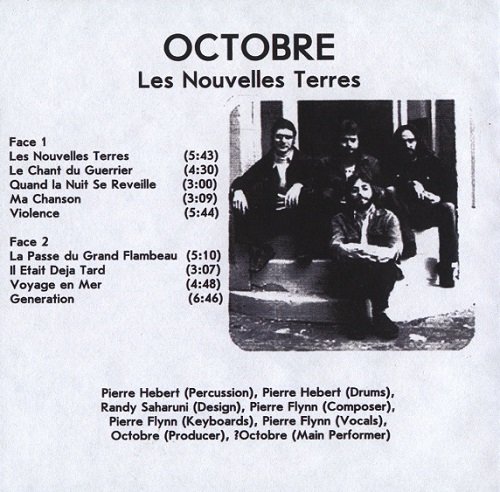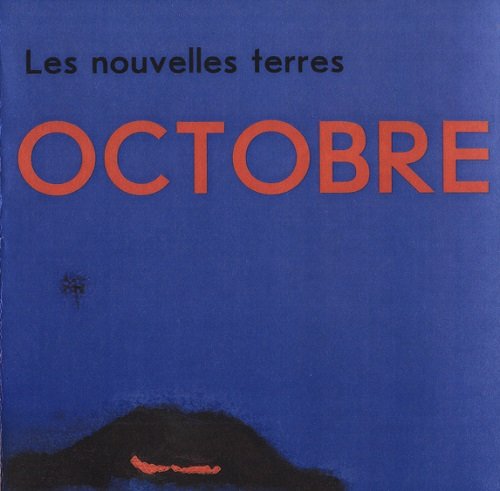
Octobre - Nouvelles Terres (1974)
BAND/ARTIST: Octobre
- Title: Nouvelles Terres
- Year Of Release: 1974
- Label: Zodiaque
- Genre: Prog Rock
- Quality: Mp3 320 / APE (image, .cue, log)
- Total Time: 42:05
- Total Size: 106/267 Mb (scans)
- WebSite: Album Preview

Tracklist:
1. Les Nouvelles Terres (5:43)
2. Le Chant De Guerrier (4:30)
3. Quand La Nuit Se Réveille (3:00)
4. Ma Chanson (3:09)
5. Violence (5:44)
6. La Passe Du Grande Flambeau (5:05)
7. Il Est Déjà Tard
8. Voyage En Mer (4:48)
9. Génération (6:46)
Line-up::
Pierre Flynn / keyboards, lead vocals
Jean Dorais / guitars
Mario Légaré / bass guitar
Pierre Hébert / drums
One of the major bands spawned by the French-Canadian or Quebecois folk rock renaissance of the early seventies along with Harmonium, Offenbach and Maneige. While not achieving quite the legendary status of their peers Octobre`s thoughtful approach to local socio-political issues combined with complexities in musical structure gave them a sound which was more parallel to contemporary progressive rock bands from the UK particularly Gentle Giant, Genesis as well as early King Crimson. After two brief experiments with cover bands 18 year old mastermind vocalist/keyboardist Pierre Flynn collaborated with bassist Mario Légaré and drummer Pierre Hébert in 1972 to form a permanent prog trio with guitarist Jean Dorais, a cousin of Flynn`s with whom he had previously played , joining shortly thereafter. The band derived its name from a political crisis which enveloped their home province of Québec, Canada in October of 1970. Their self titled album, released in late 1972 was a scant 28 minutes in duration but contained the essential ingredients for the Octobre formula which would endure for the next 7 years: 4 superbly talented young musicians which included a charismatic frontman who had a bone to pick with the system who oddly enough chose prog-rock stylings in order to convey their messages.
A haunting figure from a bourgeoisie upbringing, Flynn's intellect was deeply rooted in Québec culture and wasn't afraid to speak his mind on sensitive local social and political problems, particularly in the Montréal region, and the music of Octobre spoke to the plight of the Québecois working class albeit in a sophisticated manner both musically and lyrically. One song from the first album entitled "La Maudite Machine" (The Damn System) became an anthem for many young people in the province of Québec and launched Octobre into Québec music folklore. Yet, with their prog-rock influences which included the standard organ/electric guitar interaction with a solid rhythm section their emotionally charged lyrics found the band as somewhat of an anomaly with their idealistic messages only having real impact on audiences within the borders of Québec. This however did not detract from their exceptional musical prowess and their second album, "Les Nouvelles Terres" (The New Worlds), contained forays into the realm of jazz-rock was released in 1974. By this time the band had earned the distinction of opening for UK prog-rock outfit King Crimson on two occasions as well as headlining their own shows throughout Québec.
1975`s Survivance (Survival) was even more experimental and the band gained more momentum by adding other elements in the form of a horn section and a girl chorus which interacted nicely with Flynn`s passionate deliveries. The music got instrumentally even more intricate particularly with a track in 11/8 time appropriately entitled "Valse en Onze Temps" (Waltz in Eleven time) which gave them sort of a Mahavishnu Orchestra dimension. By 1976 after extensive touring, television appearances and musical collaborations with other Québec bands CBS Records signed them to a record deal. A noted Québec record producer was brought in and their most ambitious recording to date was released the next year in the form of "L' Autoroute des Rêves" (Highway of Dreams). It included orchestrations and even more leanings towards jazz and was to become their biggest selling album with Flynn favouring the piano over his electric keyboards and briefly discarding his doom & gloom lyrics with more hopeful musings on the opening track "Le Vent Se Lève" (The Wind Rises) which also features a small, scaled down orchestra. It was considerably more sophisticated and refined than the previous outings and contained even more emphasis on straight jazz explorations perhaps to appease the big wigs at CBS Records.
!978 culminated with a blow-out performance at the St. Denis Theatre in Montréal that featured reworkings of some of their best pieces and showcased the band at the top of their game. It featured a four piece horn section as well as an expanded girl chorus and with one of the highlights being a 12-minute Latino jam entitled Brazilia. It was subsequently released later in the year as a double live LP entitled "Live - Chants Dans La Nuit" (Live-Singing In The Night), which became, arguably the best loved Québecois live album of all time. It was complemented that year by a compilation of songs from their first three LPs entitled "Le Meilleur d`Octobre, SVP" (The Best Of Octobre, If You Please). Over the next couple of years members were involved with session work playing on recordings by other Québec artists and by 1980 progressive rock was on the wane. No band seemed to be immune to the fluctuating tastes of restless audiences with Octobre being no exception. They also had to contend with another reality with the larger record companies being reluctant to promote Quebec artists as a result of an unstable political climate in the wake of a referendum over Québec`s sovereignty from the rest of Canada. The band was nevertheless picked up by a smaller indigenous label Kébec Disk and released a final album, "Clandestins" with more upbeat yet melodic rock stylings which included a new member, saxman Gerry Leduc. Flynn`s appreciation for the beatnik literature of Jack Kerouac was reflected in a couple of tracks but the magic of the earlier years had faded. Almost remorsefully, the last track on the album, a superb short instrumental, was simply entitled "La Bout de la Ligne (Fade Out de Soleil)", which roughly translates to The End Of The Line (Fade Out of the Sun), romantically signalling the end of one of the most expressive and talented Québec bands of the 1970s.
Although only two of their albums made it into CD format, "L'Autoroute des Reves" and a shortened edition of "Live-Chants Dans la Nuit" and these have since been deleted. A comprehensive double CD retrospective "Octobre 1972-1973" was released in 1995 and was supervised by Pierre Flynn himself. It also comes with a booklet with commentaries from band members as well as French language lyrics and four live bonus tracks recorded during a reunion concert at the Montréal International Jazz Festival in 1989.
A haunting figure from a bourgeoisie upbringing, Flynn's intellect was deeply rooted in Québec culture and wasn't afraid to speak his mind on sensitive local social and political problems, particularly in the Montréal region, and the music of Octobre spoke to the plight of the Québecois working class albeit in a sophisticated manner both musically and lyrically. One song from the first album entitled "La Maudite Machine" (The Damn System) became an anthem for many young people in the province of Québec and launched Octobre into Québec music folklore. Yet, with their prog-rock influences which included the standard organ/electric guitar interaction with a solid rhythm section their emotionally charged lyrics found the band as somewhat of an anomaly with their idealistic messages only having real impact on audiences within the borders of Québec. This however did not detract from their exceptional musical prowess and their second album, "Les Nouvelles Terres" (The New Worlds), contained forays into the realm of jazz-rock was released in 1974. By this time the band had earned the distinction of opening for UK prog-rock outfit King Crimson on two occasions as well as headlining their own shows throughout Québec.
1975`s Survivance (Survival) was even more experimental and the band gained more momentum by adding other elements in the form of a horn section and a girl chorus which interacted nicely with Flynn`s passionate deliveries. The music got instrumentally even more intricate particularly with a track in 11/8 time appropriately entitled "Valse en Onze Temps" (Waltz in Eleven time) which gave them sort of a Mahavishnu Orchestra dimension. By 1976 after extensive touring, television appearances and musical collaborations with other Québec bands CBS Records signed them to a record deal. A noted Québec record producer was brought in and their most ambitious recording to date was released the next year in the form of "L' Autoroute des Rêves" (Highway of Dreams). It included orchestrations and even more leanings towards jazz and was to become their biggest selling album with Flynn favouring the piano over his electric keyboards and briefly discarding his doom & gloom lyrics with more hopeful musings on the opening track "Le Vent Se Lève" (The Wind Rises) which also features a small, scaled down orchestra. It was considerably more sophisticated and refined than the previous outings and contained even more emphasis on straight jazz explorations perhaps to appease the big wigs at CBS Records.
!978 culminated with a blow-out performance at the St. Denis Theatre in Montréal that featured reworkings of some of their best pieces and showcased the band at the top of their game. It featured a four piece horn section as well as an expanded girl chorus and with one of the highlights being a 12-minute Latino jam entitled Brazilia. It was subsequently released later in the year as a double live LP entitled "Live - Chants Dans La Nuit" (Live-Singing In The Night), which became, arguably the best loved Québecois live album of all time. It was complemented that year by a compilation of songs from their first three LPs entitled "Le Meilleur d`Octobre, SVP" (The Best Of Octobre, If You Please). Over the next couple of years members were involved with session work playing on recordings by other Québec artists and by 1980 progressive rock was on the wane. No band seemed to be immune to the fluctuating tastes of restless audiences with Octobre being no exception. They also had to contend with another reality with the larger record companies being reluctant to promote Quebec artists as a result of an unstable political climate in the wake of a referendum over Québec`s sovereignty from the rest of Canada. The band was nevertheless picked up by a smaller indigenous label Kébec Disk and released a final album, "Clandestins" with more upbeat yet melodic rock stylings which included a new member, saxman Gerry Leduc. Flynn`s appreciation for the beatnik literature of Jack Kerouac was reflected in a couple of tracks but the magic of the earlier years had faded. Almost remorsefully, the last track on the album, a superb short instrumental, was simply entitled "La Bout de la Ligne (Fade Out de Soleil)", which roughly translates to The End Of The Line (Fade Out of the Sun), romantically signalling the end of one of the most expressive and talented Québec bands of the 1970s.
Although only two of their albums made it into CD format, "L'Autoroute des Reves" and a shortened edition of "Live-Chants Dans la Nuit" and these have since been deleted. A comprehensive double CD retrospective "Octobre 1972-1973" was released in 1995 and was supervised by Pierre Flynn himself. It also comes with a booklet with commentaries from band members as well as French language lyrics and four live bonus tracks recorded during a reunion concert at the Montréal International Jazz Festival in 1989.
Oldies | Rock | FLAC / APE | Mp3
As a ISRA.CLOUD's PREMIUM member you will have the following benefits:
- Unlimited high speed downloads
- Download directly without waiting time
- Unlimited parallel downloads
- Support for download accelerators
- No advertising
- Resume broken downloads


